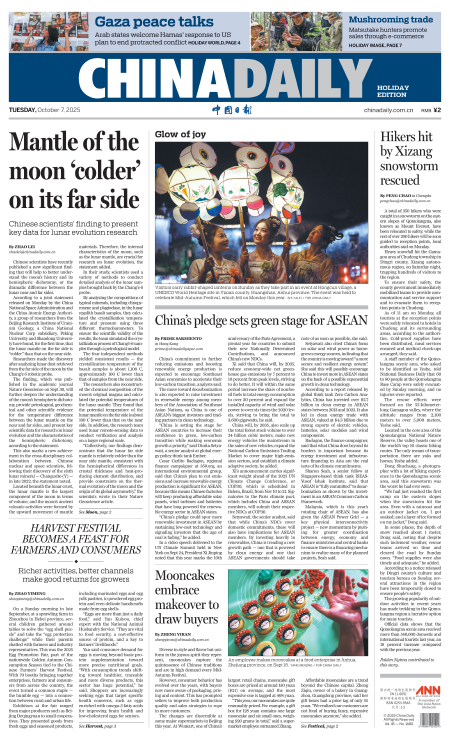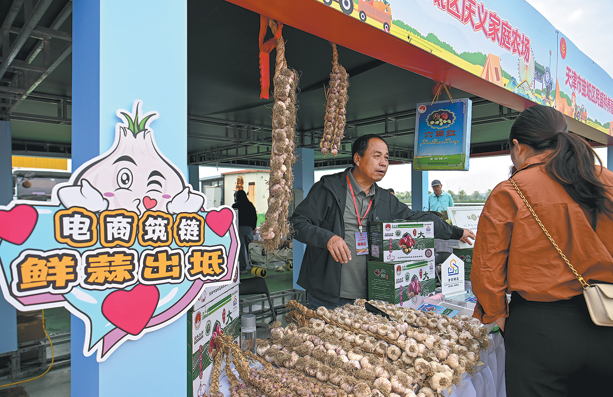
A vendor sells garlic during a Chinese Farmers' Harvest Festival event in Tianjin on Sept 23.
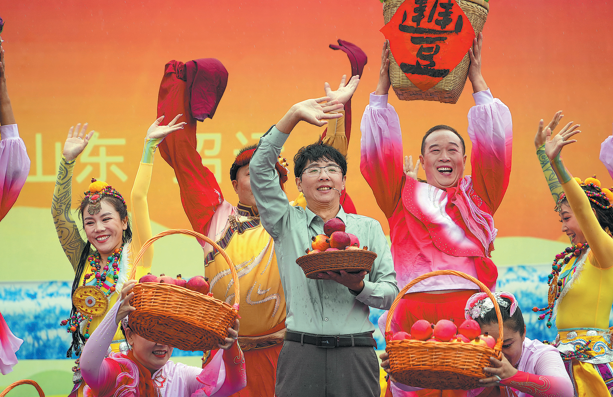
Pomegranate grower Liu Yuan (center) hits the stage with performers in promoting the produce during a festival activity in Zhaoyuan, Shandong province, on Sept 23.
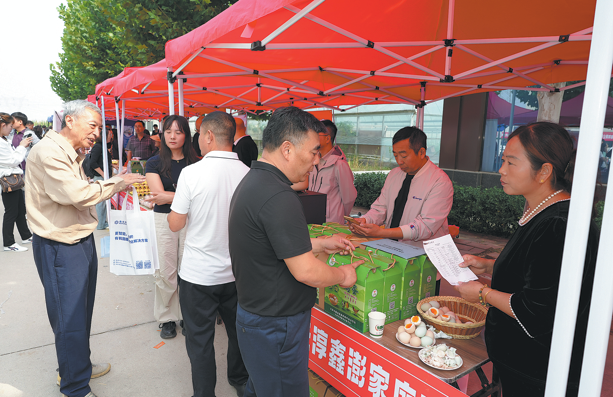
People shop during the Egg Promotion Fair in Zhuozhou, Hebei province, last month.
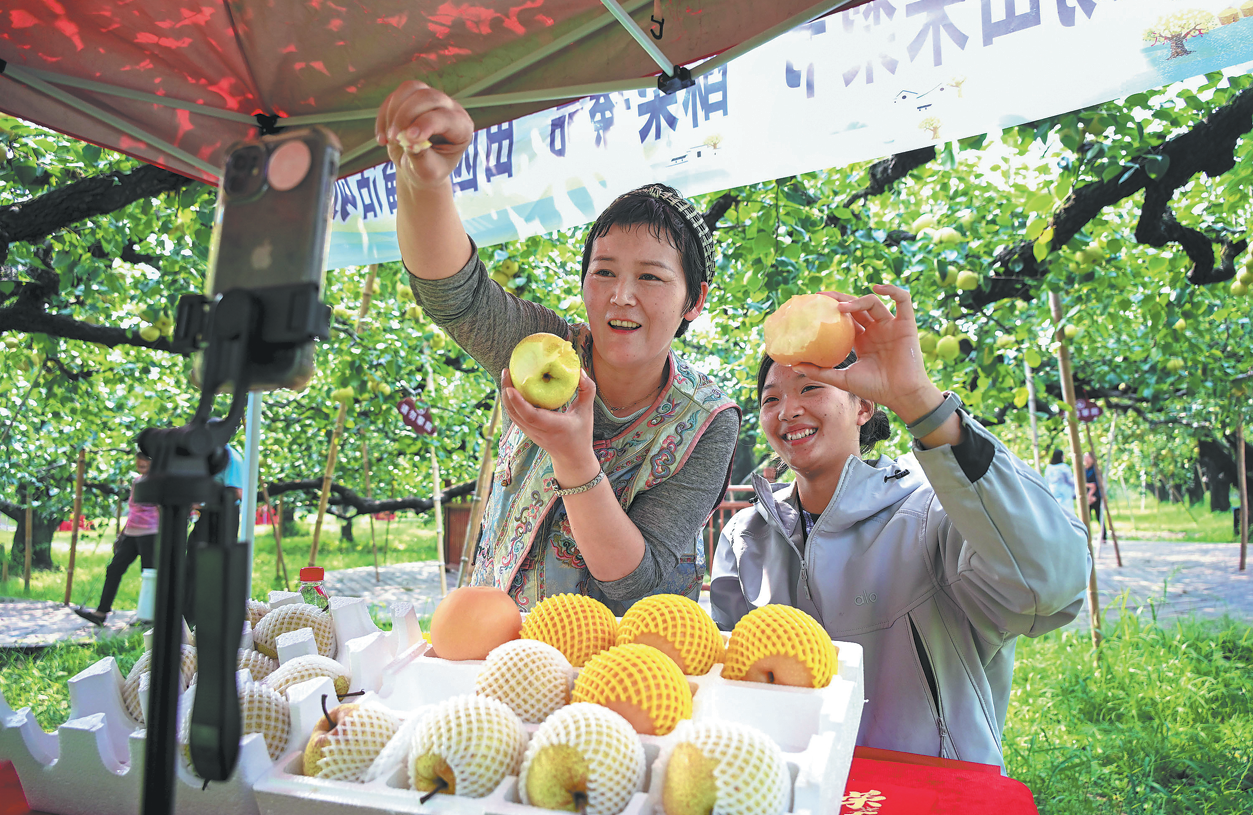
Growers promote pears during a livestreaming session at an orchard in Dangshan, Anhui province, on Sept 13.
On a Sunday morning in late September, at a sprawling farm in Zhuozhou in Hebei province, several children gathered around tables to solve the "egg shell puzzle" and take the "egg protection challenge" while their parents chatted with farmers and industry representatives. This was the 2025 Egg Promotion Fair, part of the nationwide Golden Autumn Consumption Season tied to the Chinese Farmers' Harvest Festival. With 70 booths bringing together enterprises, farmers and consumers from across the country, the event turned a common staple — the humble egg — into a connection between rural and urban life.
Exhibitors at the fair ranged from major producers such as Beijing Deqingyuan to small cooperatives. They presented goods from fresh eggs and seasoned products, including marinated eggs and egg yolk pastries, to powdered egg protein and even delicate handicrafts made from egg shells.
"Eggs are more than just a daily food," said Yan Kuiyou, chief expert with the National Animal Husbandry Service. "They are vital to food security, a cost-effective source of protein, and a key to farmers' livelihoods."
Yan said consumer demand for eggs is moving beyond basic protein supplementation toward more precise nutritional goals. "With consumption trends shifting toward healthier, traceable and more diverse products, this sector has huge potential," he said. Shoppers are increasingly seeking eggs that target specific health concerns, such as eggs enriched with omega-3 fatty acids for improving brain health and low-cholesterol eggs for seniors.
With the advent of urban lifestyles, ready-to-eat egg products such as marinated eggs and liquid egg cartons are also gaining popularity, especially among younger consumers, Yan added.
Wu Shugeng, head of the Chinese Academy of Agricultural Sciences' expert team on eggs and the event organizer, said the fair aimed to develop direct connections between suppliers and consumers. Visitors could tour the farm to see the full cycle of production, from feed processing to the making of organic fertilizer. "Eggs are a perfect entry point to promote agricultural consumption. They are found on every family's table," Wu said.
China is both the world's largest producer and consumer of eggs. But the industry faces challenges such as insufficient branding and not enough processing facilities. The fair highlighted the push toward standardized and technology-driven growth, Wu said.
Apart from videos about new farming technologies, experts answered questions face-to-face, addressing common misconceptions, including whether brown-shelled eggs were healthier than white ones, or if "native eggs" were more nutritious.
Lu Jianzhong, deputy head of the Institute of Feed Research at the academy, said consumers would get to see the transformation of modern agriculture. "We hope people not only eat better eggs but understand the science and culture behind them, while helping farmers earn more," he said.
The fair provided farmers and enterprises with win-win direct sales opportunities. Buyers from supermarkets, restaurants and e-commerce platforms signed deals on the spot, helping secure fairer prices. Platforms such as Pinduoduo and JD offered promotional support, boosting visibility for high-quality brands.
"Celebrating harvest is not only about abundance but about building bridges between science and tradition, the countryside and cities, farmers and consumers," Wu said.
Rural fairs fuel sales
From colorful rural fairs to bustling livestreaming studios, the Golden Autumn Consumption Season has turned the nation's harvest into a feast for both farmers and consumers.
Launched alongside the Chinese Farmers' Harvest Festival several years ago, the autumn consumption season is now one of its signature events. "Agricultural products should not only be grown well, but also sold well, with good returns for farmers," said Lei Liugong, head of the festival's organizing office, at a news conference in August.
Several sectors have joined over the years to promote consumption in diverse forms, attracting urban residents to the countryside and smoothening the flow between rural supply and urban demand, said Lei, who is also head of the market and information department at the Ministry of Agriculture and Rural Affairs.
According to the ministry, the event has so far generated more than 130 billion yuan ($18.3 billion) in cumulative agricultural sales and has become the festival highlight known for its strong "holiday flavor, popularity and vibrant consumption".
Boosting consumption has been one of the priorities of China's economic agenda this year. In July, 10 central government departments jointly released an implementation plan to expand agricultural product consumption.
Lei said this year's season features richer content, more benefits for consumers and closer urban-rural connections. For the first time, the Ministry of Culture and Tourism has joined as a co-organizer, along with Ministry of Agriculture and Rural Affairs, the Ministry of Commerce, the National Forestry and Grassland Administration, the All-China Federation of Supply and Marketing Cooperatives and the China Media Group.
Running from September to November, the event now links farm produce with cultural and tourism resources, encouraging not only "buying" but also "seeing, playing, learning and creating". The goal is to bring people to the countryside and vitalize the rural consumption market, Lei said.
Industry associations, e-commerce platforms and financial institutions have chipped in with attractive incentives. Six companies, including JD, Pinduoduo and Meituan, have launched promotions with subsidies, internet traffic support and training for merchants while popular livestream anchors have been mobilized to help farmers sell their produce. Eight financial institutions, including the Agricultural Bank of China and the China Construction Bank, are offering consumption vouchers and discount coupons to fuel sales.
Zeng Hao, senior director of public affairs at Pinduoduo, told China Central Television that the company would step up marketing support for quality agricultural products, with 1 billion yuan in subsidies and a 2 billion yuan traffic package to help emerging merchants.
Shen Guoji, an official with the Agriculture Ministry's market and information department, said more than 600,000 merchants are expected to participate. "Through the golden autumn consumption season, we are rolling out practical, people-centered initiatives that tap into rural and urban consumption potential," he said.
Hangzhou flavor
In Hangzhou, a hub of e-commerce and livestreaming industries in Zhejiang province, the autumn harvest festival opened on Sept 5. Local residents sampled new agricultural products and engaged in rural cultural experiences. At one booth, Zhao Jiahui from the Xiaoshan Gift Supply and Marketing Co presented a mooncake filled with traditional radish pickle. "It sounds unusual, but once people tried it, they found the flavor surprisingly good," Zhao said.
Another exhibitor, Zhejiang Chuanhua Rural Development Co, displayed orchids. The company has bred more than 500 varieties of the flower. "Orchids have become a refined gifting option for families and friends," said the product curator Ma Caihong.
Many cities, including Tianjin, Shenyang in Liaoning province, Wuhan in Hubei province, Guangzhou in Guangdong province, Chengdu in Sichuan province and Lanzhou in Gansu province have pledged to integrate resources in finance, technology and talent to host celebrations that combine the Farmers' Harvest Festival with the Mid-Autumn Festival and the National Day holiday.
From stalls selling traditional snacks to cultural tours of villages, the activities are designed to ensure both rural and urban residents share the joy of harvest and prosperity.
The consumption season is not limited to buying and selling though. Online and offline events are adding flavor to the festival. Visitors can enjoy rural stays, countryside food tours, handicraft workshops and entertainment alongside shopping, Lei said.
"This year we are making consumption promotion a priority, so that the fruits of harvest can better translate into farmers' income," said Zhu Xuefeng, an official with the agriculture and rural affairs department of Ningxia Hui autonomous region.
During the festival, Fujian province and Ningxia will jointly host events linking rural fairs across the region to feature tastings of delicacies, specialty snacks and premium agricultural products, Zhu said. The program will also extend to rural stays, countryside tours and dining, encouraging urban residents to travel to villages and boost consumption, he added.
zhaoyimeng@chinadaily.com.cn
